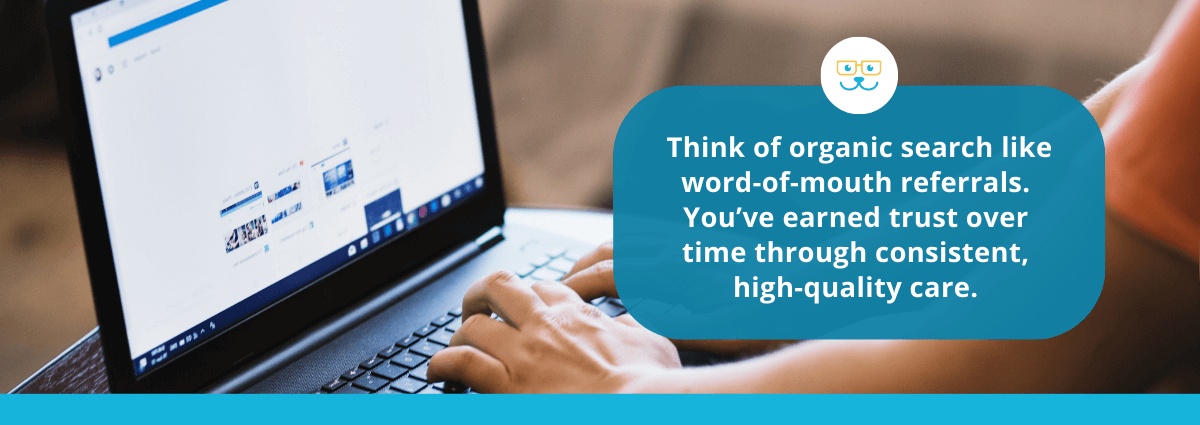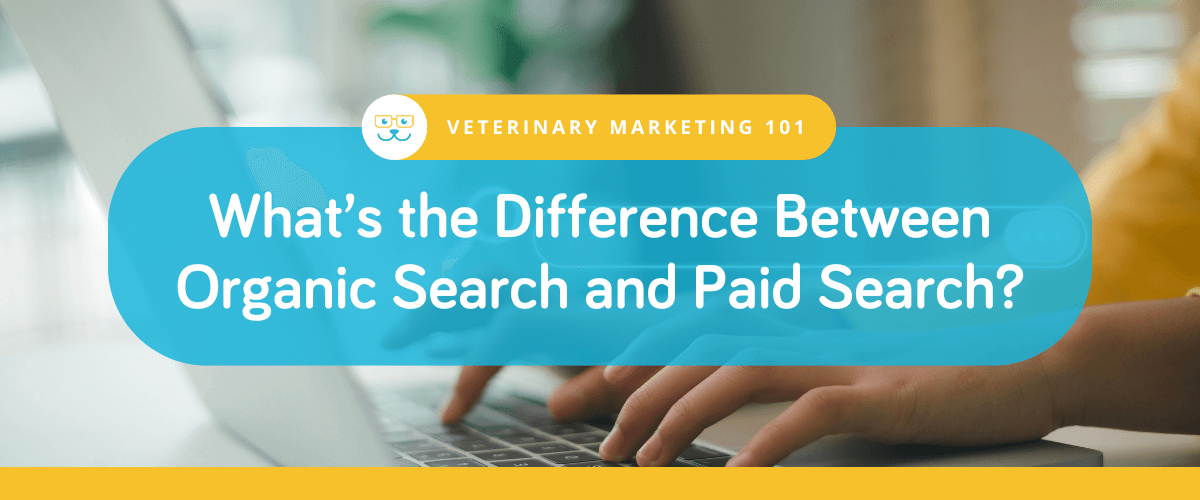What’s the Difference Between Organic Search and Paid Search?
How Organic and Paid Search Work Together to Grow Your Veterinary Practice
You know how important it is to have a strong reputation in your community. You’ve built trust with pet owners over years of caring for their animals. But in today’s digital-first world, being a great veterinarian isn’t always enough—you also need to be easy to find online.
When someone types “veterinarian near me” into Google, will they find your practice or your competitor’s?
To show up when and where it matters, you need to understand the two main ways veterinary practices appear in Google search results: organic search and paid search. Both have their place in your marketing toolbox, and when used together, they can help fill your exam rooms.
Let’s Break It Down in Veterinary Terms

Think of organic search like word-of-mouth referrals. You’ve earned trust over time through consistent, high-quality care. Google works the same way! When your website is filled with helpful content and is coded correctly, Google gradually rewards you with higher placement in the organic (unpaid) search results. This process is known as search engine optimization (SEO).
In contrast, paid search is more like putting a billboard up on the busiest street in town—but only for the pet owners who are actively looking for a vet right now. With pay-per-click (PPC) advertising, you can place your practice at the very top of search results instantly by bidding on specific keywords like “dog vaccination near me” or “emergency veterinarian open late.”
What Is Organic Search?
When a potential client searches for veterinary services and finds your website naturally, without clicking an ad, that’s organic search. These results show up based on how relevant and helpful Google thinks your content is.
If your website has detailed service pages, helpful blog posts (like how to brush a dog’s teeth or when to spay a cat), and clear info about your location, hours, and team, you’re more likely to show up organically.
Think of SEO like preventive medicine. It doesn’t give instant results, but over time it builds a healthy, lasting online presence.
Benefits of Organic Search:
- Long-term growth and visibility
- Attracts pet owners actively searching for answers
- Builds authority and trust
Challenges:
- Takes time to see results (think months, not days)
- Needs regular updates and new content
- Paid searches can appear before organic search results
What Is Paid Search?

Paid search lets you skip the line and appear right at the top of Google’s results when you put some dollars behind the clicks you receive.
With veterinary PPC, you can target high-value services like dental cleanings, surgeries, or even new puppy wellness plans. You only pay when someone clicks your ad. It’s a great way to get in front of pet owners right when they’re looking for help.
Think of paid ads like urgent care. It’s fast, effective, and can bring quick relief—especially during slow seasons or to boost new services.
Benefits of Paid Search:
- Instant visibility
- Reaches local pet owners with high intent
- Easy to track results
Challenges:
- Can get expensive without expert management
- Stops working when you stop spending
- Needs frequent optimization to stay effective
Why You Need Both

If your clinic is only relying on referrals or foot traffic, you’re leaving growth on the table. The best practices today are showing up everywhere pet owners are searching—and that means using both organic and paid search strategies.
Here’s how they work together:
- Organic search builds long-term credibility
- Paid search drives fast results when you need them
- Together, they maximize your visibility and client acquisition
Let’s say a pet owner Googles “ear infection in cats.” If your blog post shows up organically and you also have a paid ad for “veterinary dermatology in [your city],” you’re owning that search page and dramatically increasing your chance of getting the appointment.
How to Choose Where to Start
If your practice has a solid website but it’s not ranking in search results, start with an SEO audit. If you’re launching a new location or trying to boost appointments quickly, a targeted PPC campaign is the way to go.
But here’s the truth: most veterinary teams don’t have time to become Google Ads experts or SEO specialists—and that’s okay. You already have a full plate managing your practice, your staff, and your patients.
GeniusVets Knows Veterinary Marketing
At GeniusVets, we don’t dabble in digital marketing—we specialize in it, specifically for the veterinary industry because we are DVM founded. From pay-per-click to retargeting to SEO, we tailor every campaign to the real-world needs of veterinary practices.
We know your services. We know your seasons. We know what pet owners are searching for. And we know how to turn those searches into clicks—and clicks into clients.
Want to see how both organic and paid search can grow your practice?
Let’s schedule a FREE Marketing Health Exam. We’ll take a close look at your online presence and show you exactly where you’re missing opportunities and how we can help you show up where it counts.

